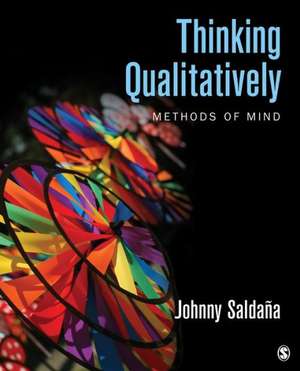Thinking Qualitatively: Methods of Mind
Autor Johnny Saldanaen Limba Engleză Paperback – 28 oct 2014
Thinking Qualitatively first explains the often used but sometimes misused terms for inquiry, followed by a review of traditional analytic basics. The book then ventures into more evocative and multidimensional ways to examine the complex patterns of daily living. Research genres such as grounded theory, phenomenology, ethnography, case study, narrative inquiry, mixed methods, and arts based research in education, the social sciences, and health care are addressed. Recent research is also cited on how the brain works and how cognitive methods harmonize with the goals of qualitative inquiry.
Written in Saldaña's elegant and accessible style, Thinking Qualitatively reveals how the researcher's mind thinks heuristically to transcend the descriptive and develop "highdeep" insights about the human condition.
Preț: 366.48 lei
Preț vechi: 699.91 lei
-48% Nou
Puncte Express: 550
Preț estimativ în valută:
70.13€ • 73.40$ • 58.37£
70.13€ • 73.40$ • 58.37£
Carte indisponibilă temporar
Doresc să fiu notificat când acest titlu va fi disponibil:
Se trimite...
Preluare comenzi: 021 569.72.76
Specificații
ISBN-13: 9781483349831
ISBN-10: 1483349837
Pagini: 240
Ilustrații: black & white illustrations, figures
Dimensiuni: 187 x 232 x 14 mm
Greutate: 0.48 kg
Ediția:1
Editura: SAGE Publications
Colecția Sage Publications, Inc
Locul publicării:Thousand Oaks, United States
ISBN-10: 1483349837
Pagini: 240
Ilustrații: black & white illustrations, figures
Dimensiuni: 187 x 232 x 14 mm
Greutate: 0.48 kg
Ediția:1
Editura: SAGE Publications
Colecția Sage Publications, Inc
Locul publicării:Thousand Oaks, United States
Recenzii
"This is book for all qualitative methodologists. Not just a “how-to” manual but an epistemological exercise in understanding qualitative methods."
"This book fills an important void in the field. The market is crowded with books on techniques and strategies for conducting qualitative research. Saldaña’s volume provides a vital complement by encouraging students to develop the core analytical skills and interpretive frames they need to be truly successful in their research endeavors. He helps students flex and hone the epistemological muscles that are at the center of capable qualitative research."
"The focus of the book is clear and consistent. The writing is superb. It deals with sophisticated ideas in a clear and highly communicative style. It weaves important and relevant scholarship in ways that help the reader grasp the key ideas. It’s one of the best books I have read (and I have read hundreds…). I will recommend it to all my doctoral advisees, as well as to the students in my classes."
"Thinking Qualitatively invites students to think before they act, and offers a rich set of options for qualitative researchers to consider."
"This book brings together key ways of thinking about our work as qualitative researchers. In many ways, it captures the breadth and depth of our work, while calling for us to be ever reflexive about our practices. I see this book as positively informing the work of novice and experienced researchers. It is a much needed addition to the qualitative research community."
Thinking Qualitatively offers many notable strengths for readers looking to discover creative approaches to qualitative inquiry, both including and beyond thinking poetically. Throughout the book, Saldaña provides detailed examples of qualitative reflection on interpersonal communication, paying strong attention to the nuances of these interactions. The exercises he includes at the end of each chapter create space for inquirers’ emotions as well as our thoughts—a unique feature of the text that makes it not only exciting but also deeply affirming.
"This book fills an important void in the field. The market is crowded with books on techniques and strategies for conducting qualitative research. Saldaña’s volume provides a vital complement by encouraging students to develop the core analytical skills and interpretive frames they need to be truly successful in their research endeavors. He helps students flex and hone the epistemological muscles that are at the center of capable qualitative research."
"The focus of the book is clear and consistent. The writing is superb. It deals with sophisticated ideas in a clear and highly communicative style. It weaves important and relevant scholarship in ways that help the reader grasp the key ideas. It’s one of the best books I have read (and I have read hundreds…). I will recommend it to all my doctoral advisees, as well as to the students in my classes."
"Thinking Qualitatively invites students to think before they act, and offers a rich set of options for qualitative researchers to consider."
"This book brings together key ways of thinking about our work as qualitative researchers. In many ways, it captures the breadth and depth of our work, while calling for us to be ever reflexive about our practices. I see this book as positively informing the work of novice and experienced researchers. It is a much needed addition to the qualitative research community."
Thinking Qualitatively offers many notable strengths for readers looking to discover creative approaches to qualitative inquiry, both including and beyond thinking poetically. Throughout the book, Saldaña provides detailed examples of qualitative reflection on interpersonal communication, paying strong attention to the nuances of these interactions. The exercises he includes at the end of each chapter create space for inquirers’ emotions as well as our thoughts—a unique feature of the text that makes it not only exciting but also deeply affirming.
Cuprins
List of Displays
Preface
Acknowledgements
About the Author
1. Introduction: Thinking About Thinking
2. Thinking Analytically
3. Thinking Realistically
4. Thinking Symbolically
5. Thinking Ethically
6. Thinking Multidisciplinarily
7. Thinking Artistically
8. Thinking Summarily
9. Thinking Interpretively
10. Thinking Narratively
11. Closure: Thoughts about Thinking
Glossary
References
Index
Preface
Acknowledgements
About the Author
1. Introduction: Thinking About Thinking
2. Thinking Analytically
3. Thinking Realistically
4. Thinking Symbolically
5. Thinking Ethically
6. Thinking Multidisciplinarily
7. Thinking Artistically
8. Thinking Summarily
9. Thinking Interpretively
10. Thinking Narratively
11. Closure: Thoughts about Thinking
Glossary
References
Index
Notă biografică
Descriere
This book boldly pursues the challenge to teach researchers not just how to collect and analyze data but how to actively think about them.
